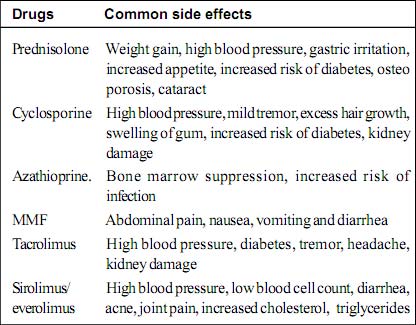88. Save Your Kidneys
3. Post-Transplant Care
What are the likely post-transplant complications?
The common possible complications after transplantation include rejection, infection, medication side effects and post-operative complications. Major considerations in post-transplant care are:
- Post-transplant medications and kidney rejection.
- Precautions to keep the transplanted kidney healthy and to prevent infections.
Post-transplant Medications and Kidney Rejection
How does post-surgical management of kidney transplantation differ from other routine surgery?
In most cases of routine surgery, post-surgical medications and care are needed for about 7-10 days. However, after kidney transplantation, lifelong regular medications and meticulous care are mandatory.
What is kidney rejection?
The immune system of the body is designed to recognize and destroy foreign proteins and antigens like harmful bacteria and viruses. When the recipient’s immune system recognizes that the transplanted kidney is not ‘its own,’ it attacks the transplanted kidney and tries to destroy it.
89. CHP. 14. Kidney Transplantation
This attack by the body’s natural defense on a transplanted kidney is known as rejection. Rejection occurs when the transplanted kidney is not accepted by the body of the transplant recipient.
Major post-transplant complications are kidney rejection, infection and side effects of drugs.
When does kidney rejection occur and what is its effect?
Rejection of the kidney can occur at any time after the transplant, most commonly in the first six months. The severity of rejection varies from patient to patient. Most rejections are mild and easily treated by proper immunosuppressant therapy. In a few patients however, rejection may be severe not responding to therapy and eventually destroying the kidney.
What medications should a patient take after transplant to prevent rejection?
- Because of the immune system of the body, there is always a risk of rejection of the transplanted kidney.
- If the immune system of the body is suppressed the risk of rejection is decreased. However, the patient becomes prone to life-threatening infections.
- Special drugs are given to patients after kidney transplantation to selectively alter the immune system and prevent rejection, but minimally impair the ability of the patient to fight infections.
Such special drugs are known as immunosuppressant drugs. At present, the most widely used immunosuppressant drugs are tacrolimus/cyclosporine, mycophenolate mofetil (MMF), sirolimus/ everolimus and prednisolone.
How long does the patient need to continue immunosuppressant drugs after kidney transplant?
Immunosuppressant medications have to be given throughout life, for as long as the kidney graft is functioning. In the immediate post transplant period, several drugs are given but their numbers and dosages are gradually reduced over time.
After kidney transplantation lifelong drug therapy is mandatory to prevent kidney rejection.
 Does the patient need any other medication after kidney transplant?
Does the patient need any other medication after kidney transplant?
Yes. After kidney transplant, in addition to immunosuppressant drugs, antihypertensive drugs, calcium, and medications to treat or prevent infection and anti-peptic ulcer medications may be prescribed.
What are the common side effects of immunosuppressant drugs?
Common side effects of immunosuppressant drugs are summarized in the following table.
What happens if transplanted kidney fails?
When a transplanted kidney fails, the patient may either undergo a second transplant or undergo dialysis.
If a transplanted kidney fails, initiation of dialysis and a second transplant are two treatment options.